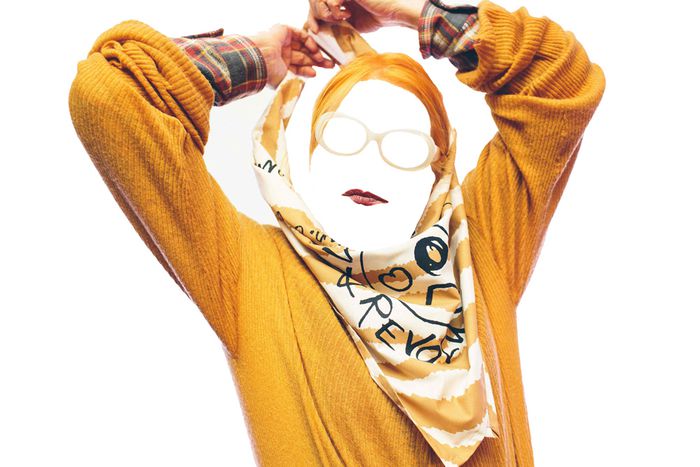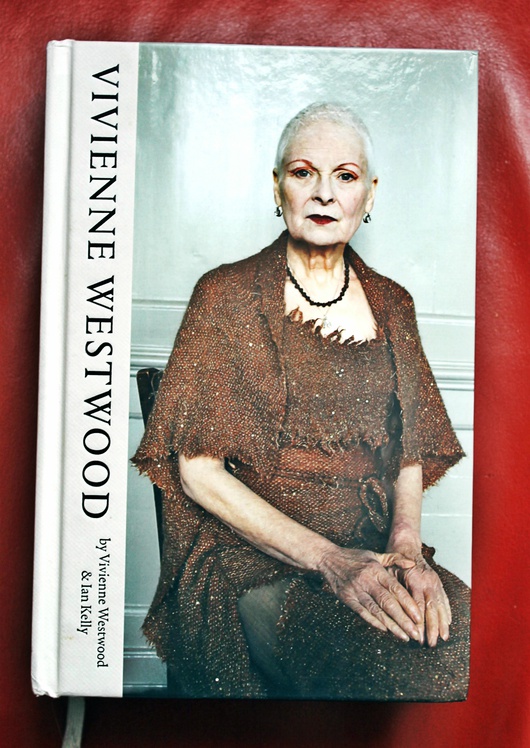
Vivienne Westwood: Revolution back in fashion?
Published on
Translation by:
Joanna ParlakVivienne Westwood has proved that one doesn't become a pirate just for a night but for their whole life. Following the punk revolt of the 70s, now she wants to foster a climate revolution, and to use art as a weapon to fight the spread of capitalist hegemony. However, will she be heard or will she be drowned out by those pointing out how she made her money?
You may not know Vivienne Westwood, but it would be impossible to not know anything about Punk. You may not give a damn about Mini Crini or "Nostalgia of Mud", but you must have heard of kids wearing swastika t-shirts while pogo dancing at Sex Pistol’s gigs.
Sure, you may not know of Vivianne Westwood and you might say you don’t care about some ageing British lady that’s known for not wearing underwear, but if, at any rate, you give a damn about people that are at the right place at the right time, I assure you that you will not find a better storyteller of Britain in the 70s – the era of people calling the Queen fascist, using safety pins as piercings (in all sort of unusual parts of their bodies) and girls wearing tartan miniskirts along with latex boots – than Vivianne Westwood.
When little Vivianne was born in 1941 in a tiny village called Tintwistle, clothes were not yet as easily accessible as they are now. It wasn’t possible to buy two tops for £1 in Primark, therefore people were forced to make clothes themselves. Vivianne also did, first in Northern England and later on in London where she met Malcolm McLaren – her brother’s mate, self-proclaimed situationist, the Sex Pistols’ manager and, as she’s later stated, a disastrously bad father of their son Joe. Vivianne and Malcolm, a pair whose relationship been full of hate rather than love, initiated a nihilistic counterculture known as punk. The trend that inverted the vectors of British morality.
Nothing sells as good as authenticity
Before we recognise fashion as an artificial mutation of the clothing industry and deny it its political dimension, we should first look at it from a slightly different angle - would a crowd of people act the same way on the advice of a general in a uniform as they would to a tourist wearing a bathing suit?
 We may also deny fashion its reactions towards society’s transformations, but wouldn’t that be like claiming that prior the twentieth century women didn’t know that their legs are just like men’s and that they can easily wear trousers? The social positivism of 70’s Britain has collapsed with a big bang and along with it so did the colourful dreams made in Swinging London. The oil prices went over the roof, the pound sterling went through a brutal devaluation and, if that wasn’t enough, the new generation of ironic urban kids – No Future – started to emerge on the wasteland of post-industrial streets of England. And it was for them (the youth interested in a specific “wrapping paper” ideal for their rebellious existence against the reality) that Vivianne Westwood started to design and make clothes. And even though the designs of those “wrappings” are still being copied by the biggest fashion retailers in the world, its contents went through a dramatic change.
We may also deny fashion its reactions towards society’s transformations, but wouldn’t that be like claiming that prior the twentieth century women didn’t know that their legs are just like men’s and that they can easily wear trousers? The social positivism of 70’s Britain has collapsed with a big bang and along with it so did the colourful dreams made in Swinging London. The oil prices went over the roof, the pound sterling went through a brutal devaluation and, if that wasn’t enough, the new generation of ironic urban kids – No Future – started to emerge on the wasteland of post-industrial streets of England. And it was for them (the youth interested in a specific “wrapping paper” ideal for their rebellious existence against the reality) that Vivianne Westwood started to design and make clothes. And even though the designs of those “wrappings” are still being copied by the biggest fashion retailers in the world, its contents went through a dramatic change.
But today Vivianne no longer wants to discuss the 70s. Nowadays, there are more important issues to talk about; such as saving the human race from extinction. Upon the publication of her autobiography, Westwood could already tick off a few other achievements on her career checklist – a former teacher, mother (of two already grown up men), wife and an owner of a fashion empire, but these days we mostly hear about Vivianne Westwood, the fighting activist. Nowadays, we don’t get to see t-shirts with formerly tipping penises, swastikas, safety pins and blusterous slogans because the designer prefers to expose the society to Julien Assange’s face and other slogans, such as "Climate Revolution" or "Save the Arctic”.
Be rebellious, visit a museum
At the time when Vivianne Westwood began selling her clothes in the Let it Rock shop on London’s Kings Road, Great Britain was facing a demanding revolt that somehow, quite quickly, burned out and was never reborn in a familiar form. And that’s the sort of revolt that Westwood wants to awaken in today’s society. However, now the fun is not in spitting on Margaret Thatcher’s face, but today’s rebellion is all about vegetarianism and trips to the museums.
In Westwood’s 2008 manifesto "Active Resistance to Propaganda" the designer urges to commit to the fight against global warming and the capitalistic hegemony of central banks. She also encourages us to read books and cultivate art, because, in her opinion, that’s the only way to stay intellectually sober and resistant to manipulation. In her biography she claims that we are all heirs to the climate tragedy and that we should fix the damage that we've done to our planet. During the Punk era, the grassroots of social movements actually managed to generate significant changes and it appears that this Brit believes that this method can also work within the modern society. Her opening line at the interviews is always the same: “We must actively pressure the government. It is not only enough to be informed, we must all act upon it.” But, who does she reach? Can she actually convince poor precarious citizens to care about the environment when they actually can’t afford to? Or those better-off who do not give a rat's arse about the exploitation of natural resources, unless it threatens their salary? Aren’t people in the public arena too busy pointing out Vivianne’s hypocrisy and easily categorising her as an eccentric visionary from a vain fashion world that’s only using activism to flatter her own vanity?
At the end of the year, I spoke to friends about elites; of how they are divorced from reality and their initiatives and aspirations have nothing to with the real world. Some of them purchase houses for hundreds of millions of dollars, some fly private jets or name their children North West. Others bring secret surveillance programs out of the closet and into the daylight or use their presence in the media to start a climate revolution. Maybe it’s just show business or maybe just altruism. In any case, they are our world’s superheroes. We want to be them, purely because of the same selfish incentives behind the decisions of ecological warrior Vivianne Westwood.
Vivienne Westwood on capitalism and clothing: 'Buy less, choose well, make it last' | Guardian Live
Translated from Vivienne Westwood: moda na rewolucję



